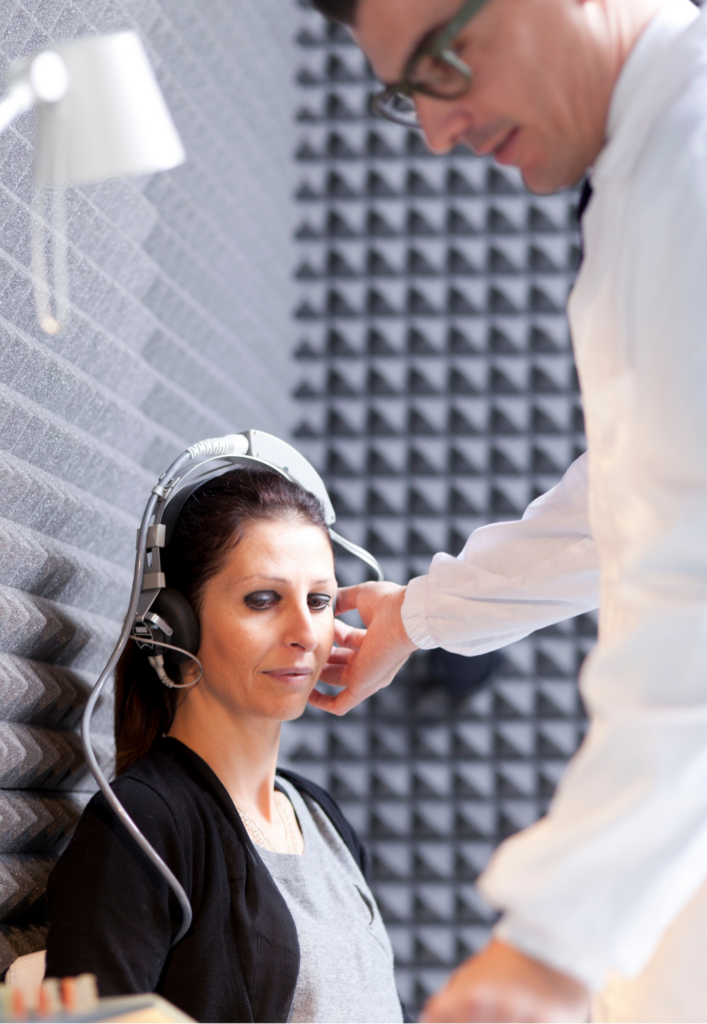Hearing loss has often been referred to as an “invisible” condition. It can take someone about 10 years to seek help. The effects of noise, infections and age can lead to a gradual loss of hearing that is hard to notice yourself. There is a lot our Audiologist can do to help.

Common signs of hearing loss:
- Speech is unclear in noisy, crowded places (restaurants, parties…)
- TV or Radio volume up too loud for other people
- Asking for repeats many times and still not hearing words clearly
- People sound like they are mumbling
- Mishearing words that sound similar
- Trouble hearing on the phone
- Increased sensitivity to loud noises like traffic, door slamming, etc.
- Difficulty hearing someone if you can’t see their lips
- Difficulty hearing someone talking from another room
- Find social situations and conversations increasingly tiring
This number is estimated to increase to 1 in 4 Australians by 2050.

Our ears are divided into three parts. The Outer Ear or Pinna collects the sounds around us. The Middle Ear is our ear canal, eardrum, and the three little ear bones. Our Inner Ear or cochlea is our hearing organ. The cochlea turns sounds into electric signals that is then sent to the brain. A hearing loss results from a disorder in any part of the process.
A disorder in any part of the ear can result in a hearing loss. There are 3 types of hearing loss.
A conductive hearing loss is one where sounds are blocked from being conducted into the hearing organ. For example, having heavy earwax an act as a plug to block your ear from sound. Likewise, fluid behind your eardrum from an infection also blocks sounds from entering.
Sensorineural hearing loss is where the sensitivity of your hearing organ has diminished as a result of loud noise, age, and some antibiotics. Sensorineural losses tend to be gradual. It can be hard for the sufferer to notice any problems as they get used to the loss over a long period of time. This type of loss is generally corrected with hearing aids.
The third type of hearing loss is called a mixed loss. It is a combination of the other two types.
Prolonged, untreated hearing loss has been linked to increased incidence of dementia.
If you are experiencing a dramatic, sudden drop of hearing over a very short period of time (eg. overnight or within hours), please seek immediate medical attention. A hearing test with an Audiologist is recommended following appropriate medical treatment.

Our Audiology Australia Accredited Audiologists follow strict testing protocols to ensure accuracy in testing. Audiologists are postgraduate experts trained specifically to identify medical indicators requiring further investigations. Not all hearing clinics employ Audiologists, be sure to check the qualifications of the person conducting the hearing test.

History Taking
Your hearing test appointment begins with a detailed history of your hearing and ear health. Your hearing history is extremely important, as no two people experience sounds the same way. Your personal sound preference is expertly matched with the test results to ensure the best outcomes for your hearing.
Contact our clinic to arrange your hearing test with our audiologists.

The Hearing Test
Our hearing tests are conducted in our custom-built Test Room: Maunam™. The hearing test room is designed to minimise interfering outside noises to ensure your results are accurate. Your audiologist will play a series of beeps and tones to you through headphones. We are looking for the softest sounds you can hear during your hearing test. We will also carry out word tests to give us a complete picture of your hearing.

Our difference
Not all hearing tests are the same. Many large chains now offer basic screening tests in an office environment as an alternative. These hearing tests are often not conducted by qualified personnel. Most concerning is that these screening results are then used as the basis for hearing aid recommendations.
Ability Hearing believes in setting up a good foundation for hearing aid success. This is why we have invested in custom-building our hearing test rooms for the most accurate results on which to base our recommendations. Our clients can be confident in solid, reassuring professional advice.
Eligible Pensioners & DVA patients can access free hearing tests and hearing aids under the Commonwealth Hearing Service Program. Read more



